Note: All translations and summaries were done by the author. Any mistakes in the text or summaries are the sole responsibility of the author.
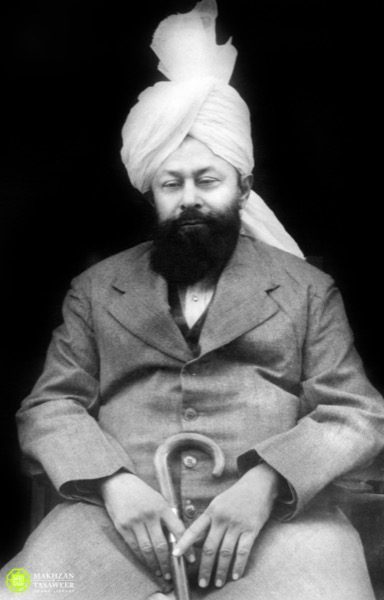
As the new year approaches, we offer heartfelt prayers of gratitude to Allah the Almighty for granting us another year of life. In reflecting on the past year, we seek direction to guide us toward success in the coming year. For Ahmadi Muslims, the words of the Khulafa-e-Ahmadiyyat offer us invaluable guidance on adjusting our lives and continued progress towards achieving our goals.
With this spirit of continual improvement, let us examine some vital advice from the sermons of the Khulafa. These gems have been chronologically ordered, and every word competes with one another in bringing us closer to finding more remarkable success and blessings in the coming year.
Recognize The Value of Your Time, and Continually Strive to Improve Yourself
On the 11th of January, 1929, the second Caliph of the Ahmadiyya Muslim Community, Hazrat Mirza Bashir-ud-Deen Mahmood Ahmad (ra), addressed the members of the community in emphasizing the value of time, stating:
“A year is not just an ordinary thing. It is a year of twelve months and fifty-two weeks, in which there are seven days per week, twenty-four hours per day, and 60 minutes per hour. Each minute comprises 60 seconds, which can be further divided. Even a second is so valuable, that all the kings of the world cannot produce it even if they sell all their possessions. All the wealth, and possessions of the world cannot buy even a hundred thousandth of a part of it. Thus, it can be imagined how great its value is. A great king may be absorbed in some measures which may be the reason for the betterment of his country or even the whole world, but he may suddenly die. At that time, he wishes that he could have had even one or two more minutes, and get a little more time so that he may explain his scheme to the others. However, at that time, he cannot even get a single minute even if he gives a billion rupees, his government, and even all the governments of the world in exchange. So, we should thank Allah profusely for having given us a valuable and extraordinary year.”
He further explained that given how valuable our time is, it serves as a reminder of our need to progress and advance according to the change of time. The only being that never needs change is God, but for humans, change is a vital need. He said:
“Therefore, the new year reminds us that we need a new beginning, a new change, new effort and new enthusiasm and perseverance. If we do not change with the tides of time, we cannot hope for any progress. Those nations that do not rise with new changes, new courage, new desires, and new aspirations perish, become extinct, and disappear. It is those nations that progress, which rise with the changes of time.” (Khutbat-e-Mahmood, Vol. 12 (1929), 11th of January)
It is thus essential to remember that true success comes from recognizing the value of time and using it to bring about ongoing change and progress within ourselves.
Initiate a Revolution Within Ourselves and Plan Ahead For Each Moment, Focusing On How We Can Be Successful In Our Tasks
On the 4th of January, 1952, Hazrat Musleh Maud (ra) delivered an awe inspiring call to action to create a revolution within ourselves. He said:
“In the coming year, we need to make more effort. We need to bring about a revolutionary change. Without this change, we cannot succeed. This revolution must take place in our minds, in our souls, in our hearts, and in our thoughts and desires. Without creating this great revolution in our hearts, spirits, and minds, we cannot achieve this position, or at least not quickly enough to achieve the status for which God Almighty has created us.”
In the following Friday sermon, he guided the community to keep track of their work and plan ahead. He said:
“We should keep a record of ourselves. For every year that comes, we should consider the coming year instead of looking at the last year. With every day we should consider that one day has now passed out of the 365 days, and how much work we needed to do. We should audit how much work we have completed and how much is left to do. If we start thinking this way, we can use our time efficiently, provided that we do so with great resolve.”
He also made an impassioned call to action to all members of the Jama’at and encouraged them with the following words:
“Instead of looking at the past, if one only looks at the coming year, and ponders over what responsibilities and duties he has in the future, how much of these he has fulfilled, and how much is left to do, he can then determine if he has enough time to complete these duties. Then will he surely become upright in his work. If a man stands with determination and keeps in mind that he is responsible for his actions, I believe that our youth and children – who are serious in their motives and understand that by accepting Ahmadiyyat they are imposing heavy duties upon themselves – may have a better year than the last. However, if they do not understand this point and they just let the nights and days pass by, neither taking action by day, nor being anxious or agitated by night, they should realize that they are drifting away from their goals, for which God has created them. May God bring spiritual light to our eyes, clarity to our hearts and minds, and grant us success in striving for the right path.” (Al-Fazl, 3rd February, 1952)
Plan, Organize, and Use Your Time Efficiently So That You Are Always Making Progress

On the first Friday of 1966, the third Caliph of the Ahmadiyya Muslim Community, Hazrat Mirza Nasir Ahmad (rh), echoed the words of Hazrat Musleh Maud (ra), and reminded the community to create a structured plan so that they would always make progress. He said:
“. . . And as I have mentioned, Hazrat Musleh Maud (ra) also repeatedly advised the community in 1952 and on other occasions to be organized in their work. They should give their work a structured form and follow a schedule or plan, otherwise our progress will not be swift. So, with this urgent advice from His Holiness, I extend my warm wishes to my brothers, and try to direct their attention to the fact that blessings also mean that the bounties of God are bestowed upon us with much greater vigour than before, and that we are stepping onto the field of struggle and Jihad. Our steps should always remain going forward and never backward. Thus, our efforts must be organized and follow a schedule or plan in continuing our struggle.”
(Friday Sermon, 8th of January, 1966)
The True Essence of Wishing Someone A Happy New Year and the Resolve of a Muslim
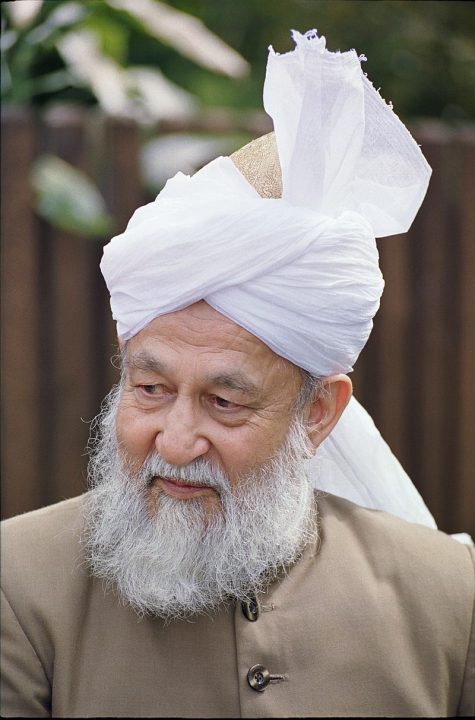
On January 2, 1987, Hazrat Khalifatul Masih IV (rh) explained the essence of time and affirmed that in the grand scheme of the universe, time is a relative term that humans use to place milestones in their lives. One might wonder what the point of these milestones are if nations engage in unruly and sinful behaviour, which brings them no lasting benefit. His Holiness then eloquently explained that the true essence of the new year lies with the believer, saying:
“[The believer] can give congratulations with conviction that Allah the Exalted, has entrusted me with the important responsibility of changing the circumstances of the world. I offer congratulations to all of you, my brothers and sisters, my wives, my children, my elders and young ones! O Muslims and non-Muslims. I offer blessings to you so that I may enter this new year with a renewed resolve so that my goodness will come to you with greater strength and intensity than before. I will make a motive of becoming ever more gracious, having greater strength and less prejudice. I will strive more than ever before just like the most gracious human, Muhammad, the Chosen One, (peace and blessings upon him), whose grace was for the general benefit of all people, for all East and all the West, for both humans and animals, for both the animate and the inanimate. In this same manner, I will strive to increase my own good efforts in the direction and in the likeness of which the blessed work of the Holy Prophet Muhammad (peace be upon him) flowed ever forth like waves. When a believer takes this pledge and enters into this new era, it is then his right to offer this congratulations to others….”
(Friday Sermon, 2nd of January, 1987)
A Muslims Way of Celebrating The New Year; A Time For Introspection
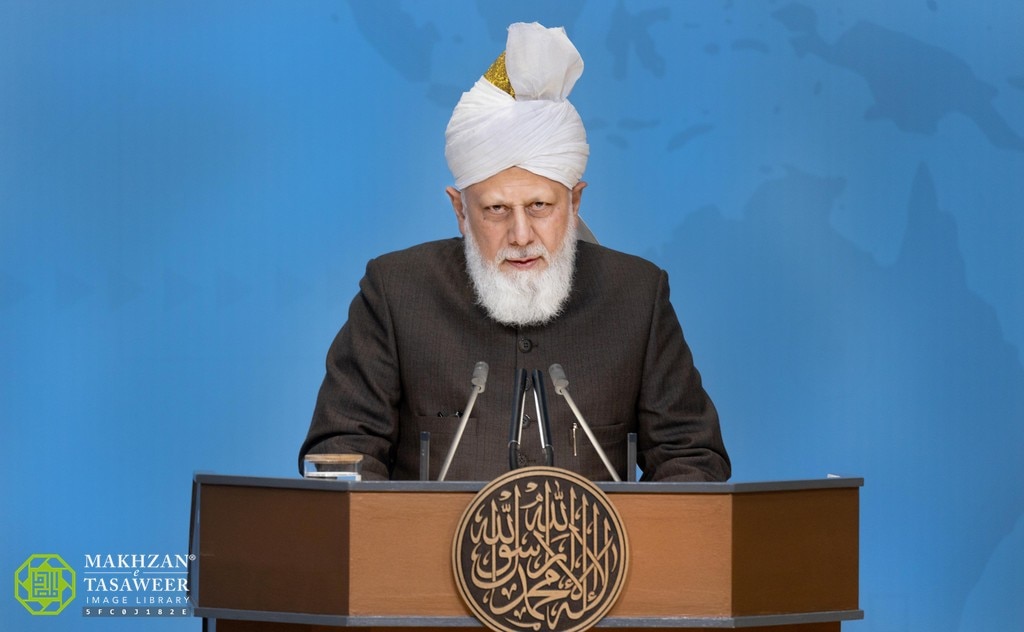
On December 30, 2016, the current head of the Ahmadiyya Muslim Community, Hazrat Mirza Masroor Ahmad (aba), presented a beautiful manifesto on how Muslims should celebrate the new year. Recognizing the current state of how many people celebrate the new year and how a believer should celebrate in contrast, he said:
“With the start of the new year on January 1st, what does the world not do to celebrate it? In the western world, moreover in the developed world especially, and even in the rest of the world, New Year’s Eve is celebrated with full enthusiasm. The people stay awake the entire night and spend their time partying and consuming alcohol. Thus, the last year is concluded, and the New Year is started with such immoral worldly activities. The majority of people have no religious concern and, therefore cannot reach into their own depths as is the case of the believer. The majesty of a true believer is not only to express distaste over such vain worldly activities, but also to conduct a self-audit and evaluate the year that has passed. What have we earned and lost this year? The true believer must audit the year and ponder what he has gained and what he has lost. From a religious and spiritual lens, he must examine what he has gained and what he has lost.”
His Holiness (aa) also provided a criterion for believers to reflect on within their souls, and to start the new year with a plan for success. May we always benefit from this invaluable wisdom, and strive to become triumphant believers in the year forward, and for many to come.
About the author: Serjeel Ahmed is a missionary serving in the Federated States of Micronesia.

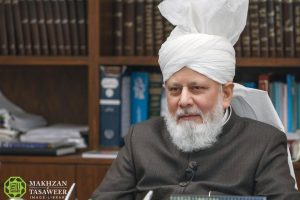

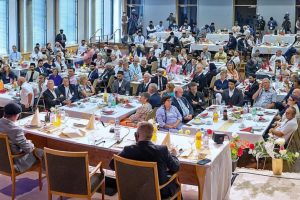
JazakAllah Murrabi sahib. Very good article mashallah. May we all benefit from the guidance of our beloved Khulafa. Ameen.